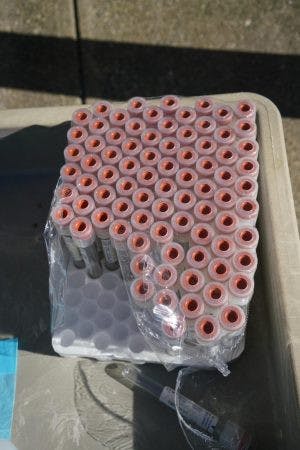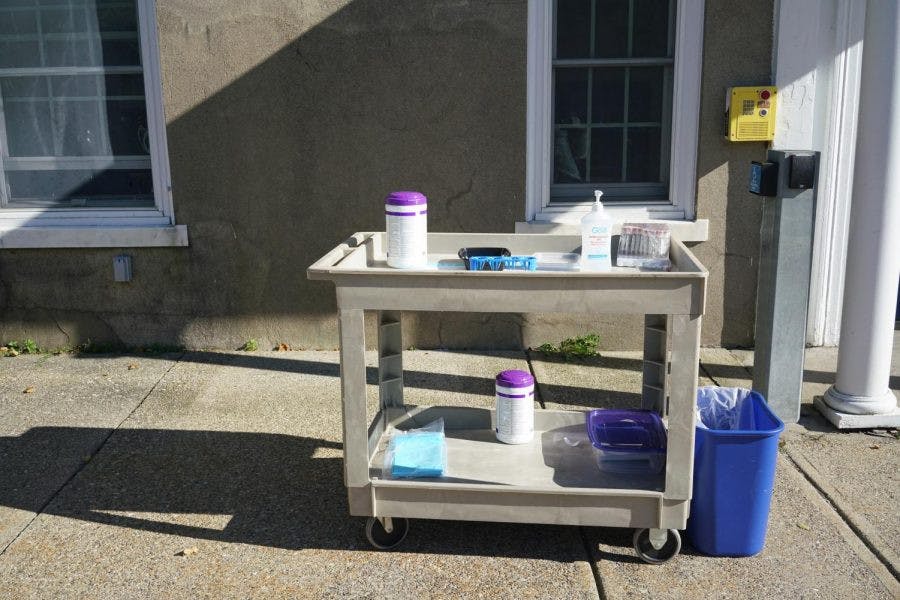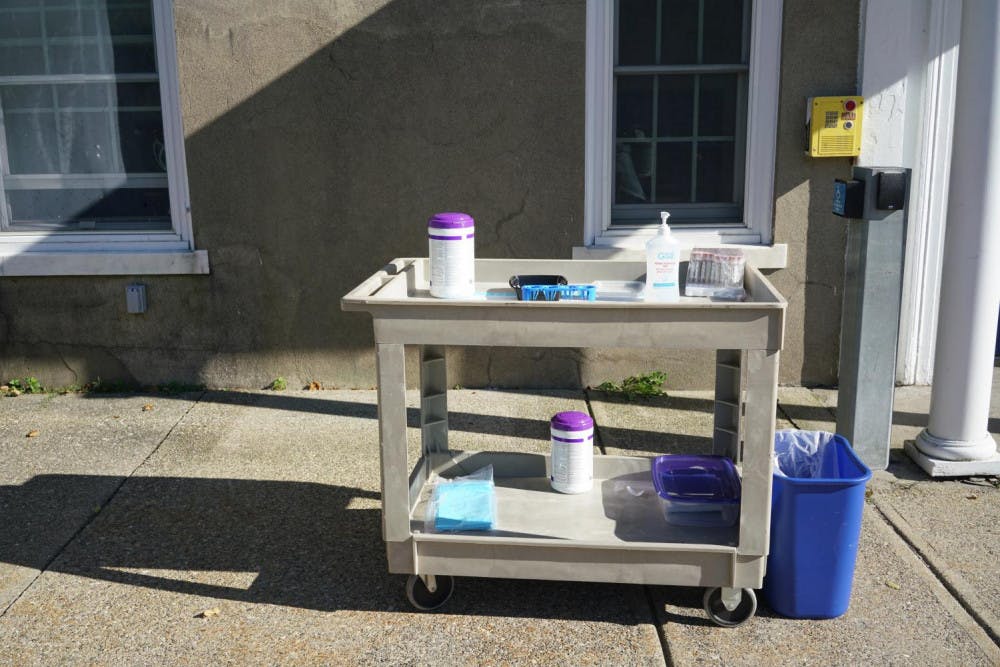Two students tested positive for Covid-19 upon arrival to Middlebury and one student tested positive post-arrival, according to Julia Ferrante, associate vice president for public affairs, putting into action the college’s policies for confirmed cases on campus and outbreak prevention.
Fourteen additional students tested positive as part of Middlebury’s pre-arrival testing program and had to delay their arrival to campus.
These cases were announced to students via email last Friday. The figures provided in the email — included under the heading “Face Covering Reminder” as an example of the necessity of mask-wearing — were 16 pre-arrival cases (combining the two who tested positive upon arrival and the 14 who tested positive before coming to campus) and the one student post-arrival case.

Several containers used in Covid-19 tests sit on a table. During the spring semester of 2021, students were each tested twice a week.
“We do not define these three cases as an ‘outbreak,’” Ferrante said in an email to The Campus. According to Ferrante, the college’s contact tracing efforts in response to the most recent case are ongoing.
“As soon as we identify a positive student case, we instruct them to isolate away from others and they are moved to isolation housing or to a location off campus where they can safely recover,” Ferrante said.
Ferrante said that the school then conducts contact tracing to identify any students who may have been infected with the virus. Fully vaccinated close contacts are required to wear masks and be re-test in three to five days, but do not have to quarantine. Unvaccinated contacts must quarantine until they receive a negative Day Seven test result and have no symptoms, unless given other directions by the Vermont Department of Health and CDC guidance.
Other NESCAC institutions have also managed positive cases — and significant outbreaks— at their campuses since the return of students this fall. Most have responded to growing case counts by increasing the frequency of their already regular and widespread testing. Some schools also increased their campus’ level of alert, placing restrictions on dining and gathering limits, and instating other measures to increase physical distancing.
At Connecticut College in New London, Conn., 169 students tested positive for Covid-19 in a single week, prompting a campus lockdown on Sept. 7, according to the school’s Covid-19 dashboard. On Sept. 13, after a week of the school’s highest alert level, some restrictions were relaxed, allowing students to return to in-person classes and athletic practices, while dining remained take-out only, and gathering limits stayed low.
Connecticut College students are tested twice per week, and the college’s administration said it believes the outbreak was related to a large number of gatherings indoors in crowded spaces — both on campus in dorms and off campus in bars and apartments — causing a “chain reaction” of spread among the student body. There are currently 20 cases on campus.
On Sept. 3, Bowdoin College in Brunswick, ME announced it would increase student testing from once a month to twice per week after a substantial increase in identified cases — at that time there were 30 students in isolation. Bowdoin also increased its alert level, restricting indoor dining capacity and gathering sizes. Bowdoin has not identified a positive student case since Sept. 14.
After identifying eight positive cases on campus the week of Aug. 31, Bates College in Lewiston, ME announced that students would be tested twice per week, as a measure to prevent a large-scale outbreak, on top of other health and safety guidelines.
“This ongoing testing is critical to understand the transmission of Covid-19 on campus, particularly among individuals who are asymptomatic, and will provide the data we need to determine whether additional public health measures are necessary to protect the health of the community,” Joshua McIntosh, vice president for campus life at Bates, told students.
McIntosh also said the school is prepared to further increase testing — as well as restrict building access, off campus travel and gathering sizes — if case counts increase substantially.
Tufts University also increased their regular student testing from weekly to twice weekly on Sept. 14 after a rise in cases. The Medford, Mass. school identified 85 cases on campus in the last seven days.

A rack used during Covid-19 testing rests on a Covid-19 testing station. In previous years, community members from outside of the college were employed to administer Covid-19 tests.
Middlebury is the only NESCAC school not testing students across the student population at least once per week, with most schools testing all students once or twice per week.
“We are ready to ramp up testing for all students if needed and would do so if prevalence indicates it is needed,” Ferrante said.
Ferrante did not say what threshold would trigger widespread testing. The Fall 2021 Campus Guide states that “Decisions about testing — including how often and how many students or employees are tested throughout the semester — will be informed by the health conditions of Addison County and Vermont, campus health conditions, and applicable guidance or requirements.”
Vermont registered its highest single-day increase in positive Covid-19 cases of the entire pandemic last week.
“We know that the best course of action is for all students, faculty, and staff to follow the protocols in place and do everything we can to prevent an outbreak,” Ferrante said. “That is one of the reasons we decided to require pre-arrival testing”— a measure not undertaken by most NESCACS — “and masks indoors, and we will consider additional measures as conditions evolve.”
A Sept. 16 email from Dean of Students Derek Doucet noted that the college’s pre-arrival testing had identified 16 positive Covid-19 cases.
Though Ferrante did not outline Middlebury’s specific plan for managing an outbreak, she described the options available to Middlebury if case counts increase.
“If we were to identify an increase in cases on campus, we have several options: limiting travel to Vermont, or to Addison County or implementing a campus quarantine for a period of time,” Ferrante said. “Given that 99 percent of our students will be vaccinated, we also offer the option for students to recover at an off-campus location if they are medically cleared to do so.”
The Campus spoke with Jessie* ’24, who tested positive for Covid-19 and is currently in isolation housing. Jessie said they had begun to feel unwell early last week but did not believe they had Covid-19.
Jessie was tested as a part of the international student arrival-testing process. According to Middlebury’s Fall 2021 Campus Guide, all students arriving from an international point of origin completed a week of arrival testing — students received a test upon arrival and were tested again twice in the following week.
Jessie said that while they provided the student health center with their list of close contacts, they felt, with the increased transmissibility of the Delta Variant, it was difficult to know if they might have exposed anyone else. Jessie said they attended classes last week before receiving their positive test, but ate meals in their room.
Ferrante said that students experiencing even mild symptoms should immediately seek testing at the Health Center.
*Jessie is a pseudonym used to protect the anonymity of a student.
Further resources and information on the Covid-19 protocols and policies can be found here.

Cat McLaughlin is a super-senior feb from Gilford, NH. As a political science major, she became interested in journalism through media studies. In her free time she enjoys alpine skiing and sailing. She also has worked as a ski coach at the Middlebury Snow Bowl, is a lover of Proc dining hall, is hooked on iced coffee, and watches the Pride and Prejudice movie at least 20 times per year.




